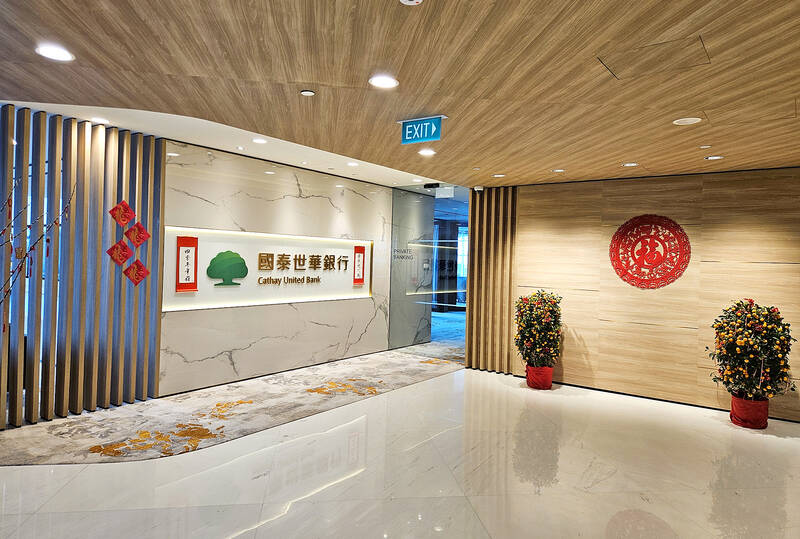Cathay United Bank (CUB) Singapore Branch saw its long-term commitment to green finance bear fruit in the final quarter last year after it closed a green trade loan deal with Apeiron Bioenergy (Apeiron), a leading player in Singapore’s sustainable energy sector. The entire loan proceeds will support Apeiron’s procurement of used cooking oil (UCO) for the production of sustainable aviation fuel (SAF), thereby demonstrating CUB’s resolve to advance net zero sustainability.
As the transport hub of Southeast Asia and one of Asia’s major financial centers, Singapore has spared no effort in promoting the Singapore Sustainable Air Hub Blueprint as well as clean energy for the aviation industry. In comparison to traditional aviation fuel, SAF has the potential to reduce carbon dioxide emissions in the air transport industry by up to 80%, thus making energy management all the more efficient. As the first bank in Taiwan to sign the Equator Principles, CUB is deeply committed to the UN Sustainable Development Goals, and has assisted its customers in their low carbon transition through diverse financial services. As of the end of 2023, the balance of CUB’s sustainable loans to customers at home and abroad reached an astounding USD 1.99 billion.
Apeiron is actively developing various biofuel solutions. Headquartered in Singapore, Apeiron’s operations span across 10 countries, featuring a comprehensive value chain that includes storage, processing facilities, and biofuel refineries. Since 2017, Apeiron has supplied over 600 million litres of UCO for the production of biodiesel and renewable diesel, including SAFs, which has contributed to an estimated savings of 1.8 million tonnes of greenhouse gas emissions. In addition, Apeiron places a strong emphasis on traceability and adheres to stringent ecological and social criteria, thus ensuring traceability within the bioenergy sector. Apeiron’s commitment to excellence is reflected in its green trade loan with CUB: the green trade loan was structured according to the Green Loan Principles published by the Asia Pacific Loan Market Association, Loan Market Association, and Loan Syndications and Trading Association; and the company’s Green Financing Framework endorsed by Morningstar Sustainalytics, thereby ensuring proper management of the loan proceeds.

Photo: Cathay United Bank (CUB)
CUB is dedicated to creating a low-carbon economy, partnering with external institutions and actively engaging in carbon reduction initiatives. Maximizing the full extent of its core financial capabilities and influence, CUB has developed comprehensive climate finance solutions that offer customers green sustainable loans and support in building sustainable supply chains. Together, these efforts lower the threshold for customers seeking to reduce carbon emissions and assists them in developing net-zero businesses.

Taiwan Semiconductor Manufacturing Co (TSMC, 台積電) last week recorded an increase in the number of shareholders to the highest in almost eight months, despite its share price falling 3.38 percent from the previous week, Taiwan Stock Exchange data released on Saturday showed. As of Friday, TSMC had 1.88 million shareholders, the most since the week of April 25 and an increase of 31,870 from the previous week, the data showed. The number of shareholders jumped despite a drop of NT$50 (US$1.59), or 3.38 percent, in TSMC’s share price from a week earlier to NT$1,430, as investors took profits from their earlier gains

In a high-security Shenzhen laboratory, Chinese scientists have built what Washington has spent years trying to prevent: a prototype of a machine capable of producing the cutting-edge semiconductor chips that power artificial intelligence (AI), smartphones and weapons central to Western military dominance, Reuters has learned. Completed early this year and undergoing testing, the prototype fills nearly an entire factory floor. It was built by a team of former engineers from Dutch semiconductor giant ASML who reverse-engineered the company’s extreme ultraviolet lithography (EUV) machines, according to two people with knowledge of the project. EUV machines sit at the heart of a technological Cold

Taiwan’s long-term economic competitiveness will hinge not only on national champions like Taiwan Semiconductor Manufacturing Co. (TSMC, 台積電) but also on the widespread adoption of artificial intelligence (AI) and other emerging technologies, a US-based scholar has said. At a lecture in Taipei on Tuesday, Jeffrey Ding, assistant professor of political science at the George Washington University and author of "Technology and the Rise of Great Powers," argued that historical experience shows that general-purpose technologies (GPTs) — such as electricity, computers and now AI — shape long-term economic advantages through their diffusion across the broader economy. "What really matters is not who pioneers

TAIWAN VALUE CHAIN: Foxtron is to fully own Luxgen following the transaction and it plans to launch a new electric model, the Foxtron Bria, in Taiwan next year Yulon Motor Co (裕隆汽車) yesterday said that its board of directors approved the disposal of its electric vehicle (EV) unit, Luxgen Motor Co (納智捷汽車), to Foxtron Vehicle Technologies Co (鴻華先進) for NT$787.6 million (US$24.98 million). Foxtron, a half-half joint venture between Yulon affiliate Hua-Chuang Automobile Information Technical Center Co (華創車電) and Hon Hai Precision Industry Co (鴻海精密), expects to wrap up the deal in the first quarter of next year. Foxtron would fully own Luxgen following the transaction, including five car distributing companies, outlets and all employees. The deal is subject to the approval of the Fair Trade Commission, Foxtron said. “Foxtron will be